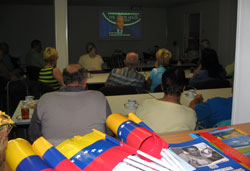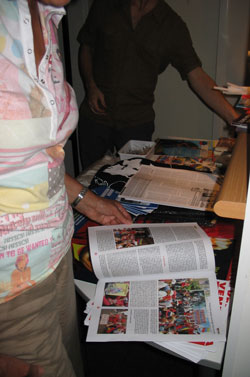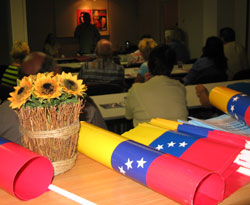Terneuzen: first meeting of Hands Off Venezuela in the Netherlands
- 20 October 2006
Hands Off Venezuela was invited in September by the trade union ABVAKABO, Zeeuws-Vlaanderen branch, to provide information during a solidarity evening for Venezuela.
 Following the Flemish day of solidarity with Venezuela, the campaign is blowing across the border. Luk
Brusselaers was so enthusiastic about the meeting in Antwerp in April that he convinced his local
trade union branch to invite the members of Hands Off Venezuela to Terneuzen.
ABVAKABO is more or less the Dutch sister of the ACOD, i.e. the socialist trade
union for public service employees.
Following the Flemish day of solidarity with Venezuela, the campaign is blowing across the border. Luk
Brusselaers was so enthusiastic about the meeting in Antwerp in April that he convinced his local
trade union branch to invite the members of Hands Off Venezuela to Terneuzen.
ABVAKABO is more or less the Dutch sister of the ACOD, i.e. the socialist trade
union for public service employees.
Notice of the meeting was circulated beforehand throughout the ABVAKABO via their members' magazine AANEEN. Various positive reactions were received from trade unionists, from Groningen and Amsterdam among others. The local press also found room for announcements with accompanying articles: "Union holds Venezuela evening" (PZC 14/09/06) and "Focus on Venezuela at trade union meeting" (BN/De stem 14/09/06). The articles in both newspapers opened as follows:
"It won't be widely known that the president of Venezuela, Hugo Chavez, is an honorary member of a Belgian trade union, and neither that his ‘Bolivarian' revolution is supported by the English and Italian trade union movements. But the ABVAKABO makes it clear that they stand behind their sister unions. With a film screening and lecture, this evening in Terneuzen, they want to stimulate international solidarity. The way in which Venezuela is developing under Chavez's leadership, is diametrically opposed to that of the European countries. While Europe opts for a free market, privatisation and cutbacks in medical and social services, in Venezuela companies are being nationalised and the profits used for those services and for free education."
Today's Europe opts unequivocally for the free market. The six commandments of the free market have become sacrosanct: globalisation, technological innovation, liberalisation, deregulation, privatisation and competition. The results of this are the dismantling of social and medical services, increasing redundancies, a structural unemployment problem, more pressure at work, longer working hours etc. Trade unions look on in horror and demand urgent solutions. It is for this reason that trade unionists are beginning to look towards the Bolivarian Revolution.
Over the wall
 ABVAKABO Zeeuws-Vlaanderen is the smallest branch in
the country. Due to good campaign work their meeting room in Terneuzen was
filled with 22 people, with every chair occupied. Among them of course were
various trade union members, but there was also an SP council member and a
Venezuelan woman. As soon as she saw our stand with material, the Venezuelan
said enthusiastically: "Hands Off Venezuela! Chavez has said so much about you
in London! It's
good that you are here."
ABVAKABO Zeeuws-Vlaanderen is the smallest branch in
the country. Due to good campaign work their meeting room in Terneuzen was
filled with 22 people, with every chair occupied. Among them of course were
various trade union members, but there was also an SP council member and a
Venezuelan woman. As soon as she saw our stand with material, the Venezuelan
said enthusiastically: "Hands Off Venezuela! Chavez has said so much about you
in London! It's
good that you are here."
The vice-chairperson Bernadette Menu, who presided over the evening, explained that the ABVAKABO Zeeuws-Vlaanderen wanted to take a look "over the wall" of local trade union practice, by organising an information evening to look at the Venezuela of today with the trade union of tomorrow in mind. She welcomed the members of Hands Off Venezuela, after which the documentary The Revolution will not be Televised was shown. The audience was absolutely fascinated by this political thriller about the coup d'état against Chavez in 2002. Everyone watched with bated breath.
After the documentary Erik Demeester of Hands Off Venezuela provided some clarification on the revolutionary process. He explained how today's Venezuela forms a concrete example of an alternative model of society. In this context Chavez symbolises a mass movement of the grass roots. The population of Venezuela participates in the political process, and the political process is for the people. The new constitution forms the basis of a participatory democracy. Through nationalisation the people regain their grip on the economy. Profits are used for free education, medical and social services. In this way the welfare of the population has been impressively improved. At last people have hope again...
With this unique and peaceful political process of self-organisation of the people, Venezuela is a true pioneer. The trade unions play an essential role in all this - in fact some companies are now run by the workers themselves. The proceeds flow back to them and to social programmes. This social model chooses solidarity above profit maximisation.
It's hardly surprising that such a movement terrifies the establishment and that Chavez finds himself under immense international pressure. The Revolution will not be Televised is the filming of the failed coup organised by the CIA in 2002. The people spontaneously took to the streets and peacefully restored power. Chavez was liberated by the people!
According to opinion polls he will again obtain a majority in the presidential elections on December 3rd, 2006. In the past he attained the sort of absolute majorities that other presidents only dream of! Meanwhile his popularity continues to grow.
Inspiring debate
After this explanation by Erik Demeester the debate was opened to the audience. A trade union member wondered why there is so much ignorance in the Netherlands about Venezuela. The media are apparently not as independent as one might hope. The press marginalises events by means of a policy of meagre and above all negative reporting. The expectation is that after the election they will present Chavez again as a diabolical dictator.
 The Hands Off Venezuela campaign wishes to provide an
antidote to this, informing the public about the revolution in Venezuela and
making people here conscious of the fact that there isn't a dictatorship there,
but rather new hope. The movement in Venezuela is under enormous
pressure from international imperialism. Our solidarity is tremendously
important for Venezuela,
and also for the rest of the world. The model also offers new perspectives for
trade unions. A trade unionist argued that trade unions are again in need of an
ideology, and that Venezuela
is pointing in the right direction.
The Hands Off Venezuela campaign wishes to provide an
antidote to this, informing the public about the revolution in Venezuela and
making people here conscious of the fact that there isn't a dictatorship there,
but rather new hope. The movement in Venezuela is under enormous
pressure from international imperialism. Our solidarity is tremendously
important for Venezuela,
and also for the rest of the world. The model also offers new perspectives for
trade unions. A trade unionist argued that trade unions are again in need of an
ideology, and that Venezuela
is pointing in the right direction.
It is tremendously important that the work of the campaign is also continued in the Netherlands. The Dutch media and politicians are sharply critical of Venezuela. A few months ago, for instance, they accused Chavez of planning an invasion of the Antilles. Here the Dutch government was playing along with Bush's campaign of dirty tricks to internationally discredit the Bolivarian Revolution and pave the way for a possible military invasion. In Terneuzen, however, an Antillean pointed out that the Antilles did not experience any colonial repression at the hands of Venezuela, but rather from the Netherlands. He added that many Antilleans would themselves very much appreciate a taste of the Bolivarian Revolution so that they also could have free education and health care.
Inspired by the heat of the debate, some of those present immediately decided to hold another meeting before the elections. They will stay in contact in order to organise another evening elsewhere in Zeeuws-Vlaanderen. The purpose of the evening was after all to get the solidarity campaign going in the Netherlands. It can serve as an example for other Dutch trade union branches.
After the debate, the Venezuelan woman asked if she could say something. "Thank you Hands off Venezuela for what you are doing for my people." Then the words stuck in her throat and she began to cry. These emotions show how deeply the Bolivarian revolution is felt. It also shows how important international solidarity is for the Venezuelan people.
Many of those present stayed and talked for another hour. We sold about 30 Euros worth of material, and received a gift of some pens from ABVAKABO and 100 Euros expenses for transport and speaker.
Would you also like to organise a solidarity activity for Venezuela in the Netherlands? Get in touch with us at This email address is being protected from spambots. You need JavaScript enabled to view it.

 Please help build the campaign by
Please help build the campaign by